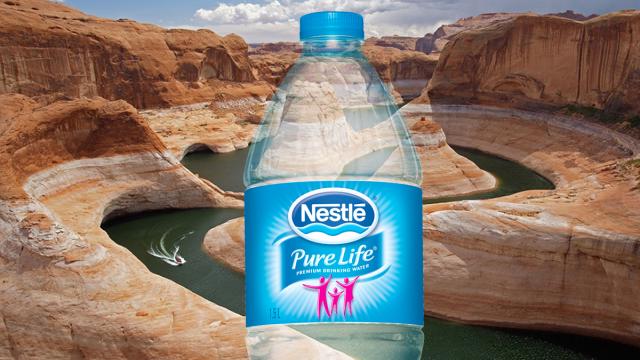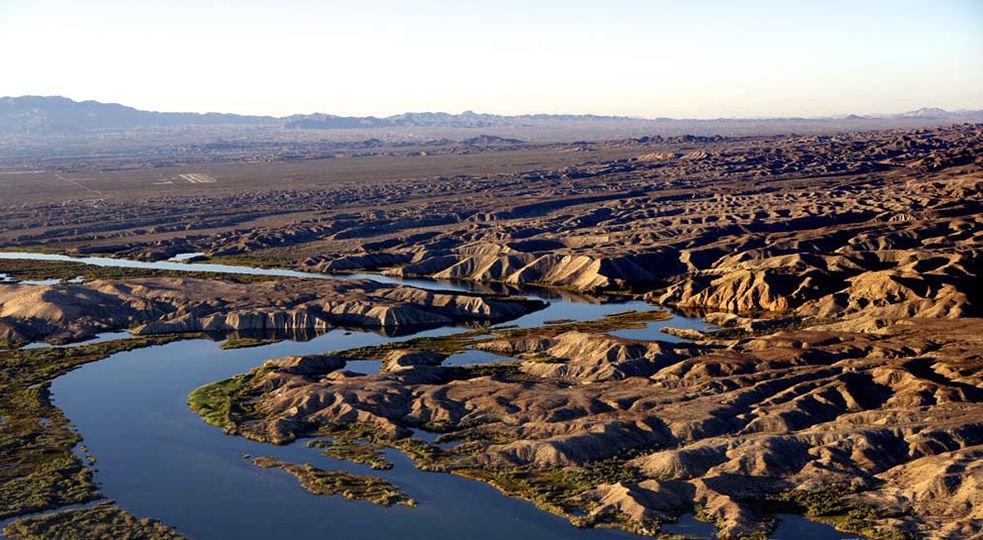
Imagine the swift and fierce government response if Al-Qaeda took a precious resource out of a delicate environment, sold it for profit and endangered 40 million people in the process. Now compare that example to the nonexistent government response to American energy companies, golf courses and corporations like Nestlé taking 75 percent of the groundwater out of the Colorado River Basin at a time when the American West is facing a record drought.
Corporations will continue to abuse their constitutional protections as legal “persons” until fresh water has become fully privatized, or until corporate constitutional rights are eliminated with a constitutional amendment.
Depleting a Precious Resource
Nestlé has two plants on the Colorado River Basin that take in water to bottle and sell under its Arrowhead and Pure Life brands. One is in Salida, Colorado, on the eastern edge of the Upper Basin; the other is in the San Gorgonio Pass, halfway between San Bernardino and Indio, Calif., on the western edge of the Lower Basin. According to annual reports filed up to 2009, Nestlé bottles between 595 and 1,366 acre-feet of water per year – enough to flood that many acres under a foot of water – from the California source. The company takes 200 additional acre-feet per year from the Colorado source. This means altogether Nestlé is draining the Colorado River Basin of anywhere from 250 million to 510 million gallons of water per year, according to the acre-feet-to-gallons conversion calculator.
The Colorado River Basin is an especially critical water resource, responsible for supplying municipal water to 40 million Americans and irrigating 5.5 million acres of land. As the US Bureau of Reclamation has documented, 22 federally-recognized tribes, seven national wildlife refuges, four national recreation areas, and 11 national parks depend on the basin. In a new report by NASA and the University of California at Irvine, researchers discovered that between December of 2004 and November of 2013, the basin lost 53 million acre-feet of water. 41 million acre-feet, or 75 percent of that loss, came from groundwater sources, like those pumped by Nestlé. That’s more than twice the amount of water contained in Lake Mead, America’s largest freshwater reservoir. In the meantime, Nestlé, with 29 water bottling facilities across North America, pocketed $4 billion in revenue from bottled water sales in 2012 alone.
But Nestlé isn’t alone in abusing the main water source of the Western United States. Expansive golf courses in desert areas, like those in Arizona and Southern California, require hundreds of thousands of gallons of water per day to maintain. According to the United States Golf Association (USGA), 2 million acres of American golf courses are irrigated, or 80 percent of the country's total golf course acreage.Between 2003 and 2005, the USGA estimated that 2,312,701 acre-feet of water was used to maintain golf courses, amounting to over 2 billion gallons of water per day. An NPR report from 2008 put that in perspective, comparing the average daily water usage of one golf course to the amount of water used by one American family over the course of 4 years.
An “Insurmountable” Water Crisis by 2040
Egregious abuses of limited freshwater supplies have led to panic from some and greed from others. If current drought conditions and water usage patterns persist, it’s estimated that the world will face an “insurmountable” water crisis by 2040. Aarhaus University of Denmark, the Vermont Law School and the nonprofit CNA Corporation recently released a study showing that a global population increase compounded by an exponential increase in water consumption will inevitably lead to drastic drought conditions unless immediate action is taken. The study projected a 40 percent gap between water supply and demand by 2030 under current conditions.
According to the study, 41 percent of American freshwater consumption came from energy production alone. Energy sources like nuclear and coal power were responsible for the bulk of water consumption, though the process of hydraulic fracturing – better known as fracking, where jets of water mixed with chemicals are blasted underground to break up shale formations that produce natural gas – was also high on the list. A prime example is Texas, where the population is expected to skyrocket from 25 million to 55 million in the next 35 years. Texas currently draws 91 percent of its electricity from natural gas, nuclear and coal power. And in the summer of 2011, Texas experienced its worst drought in history.
Outdoing Texas, California is now facing its worst drought in 1,200 years. Latest numbers from the National Drought Mitigation Center show that 80 percent of California is in “extreme drought.” A full 31 percent of California is experiencing “exceptional drought” conditions, including population centers like Los Angeles, Oakland, and San Francisco. Food prices have gone up by an average of 2.5 percent since last year, and are expected to increase by another 3.5 percent before year's end. No less than 85 percent of the lettuce Americans eat comes from drought-ravaged California. Fresh fruits and vegetable prices are projected to increase by 6 percent in the coming months as a result of the drought.
Constitutionally-Protected Corporate Greed
The research community isn’t the only group of people paying attention to the writing on the wall. Corporate executives are quickly making moves to privatize water resources, declaring the resource to be the next oil. Peter Brabeck, chairman and former CEO of Nestlé, has openly said that "access to water is not a public right." This is in spite of UN Resolution 64/292, which declares that water and sanitation are both basic human rights. The World Health Organization has said that one person needs 20 liters of water for “survival” levels of use, including bathing and laundry. As I wrote previously for Occupy.com, the France-based Suez company is using a New Jersey-based subsidiary to prepare a buyout of Detroit’s water infrastructure, with a potential end goal of privatizing the Detroit River and the Great Lakes.
Researchers argue for greater regulation of water usage to prevent future global drought, though that becomes complicated when looking into how such regulations would be implemented and enforced. The US Bureau of Reclamation monitors surface water, but groundwater regulation is up to individual states. And in the Colorado River Basin, for example, California has no regulations on groundwater usagedespite the Bay Area implementing strict new penalties for excessive use of water. Even if federal or state agencies wanted to intervene to stop corporate entities like golf courses, power companies or Nestlé from using up precious groundwater resources, corporations and their profits are protected under the constitution, giving them the same rights as actual human beings.
Ever since the Supreme Court established that corporations are legally people in the Santa Clara County v. Southern Pacific Railroadruling of 1886, corporations have successfully overridden a slew of regulations citing the equal protection clause under the 14th Amendment. By proving that a certain regulation would unduly infringe on a corporation’s ability to make a profit, well-heeled corporate entities have lawyered up to defy regulatory agencies for over a century. The Buckley v. Valeo ruling in 1976 further ensconced corporate personhood, and the Citizens United v. FEC ruling in January of 2010 established the precedent that because corporations have the same legal rights as a person, their money is considered free speech. So not only can corporations defy any new regulation on their future usage of precious water resources, but they can spend unlimited amounts of money in election cycles to elect politicians who will prioritize their right to make a profit over a citizen’s right to have access to water.
As long as corporations are given the same constitutional protections as people, they’ll always escape regulation and accountability for their actions. Simply "getting money out of politics" is not enough – only a constitutional amendment that explicitly abolishes the concept of corporate personhood and separates money from free speech will guarantee that necessary actions can be taken to prevent a disastrous water shortage.
Carl Gibson, is a spokesman and organizer for US Uncut, a nonviolent, creative direct-action movement to stop budget cuts by getting corporations to pay their fair share of taxes. Contact Carl on the Commons.
3 WAYS TO SHOW YOUR SUPPORT
- Log in to post comments












